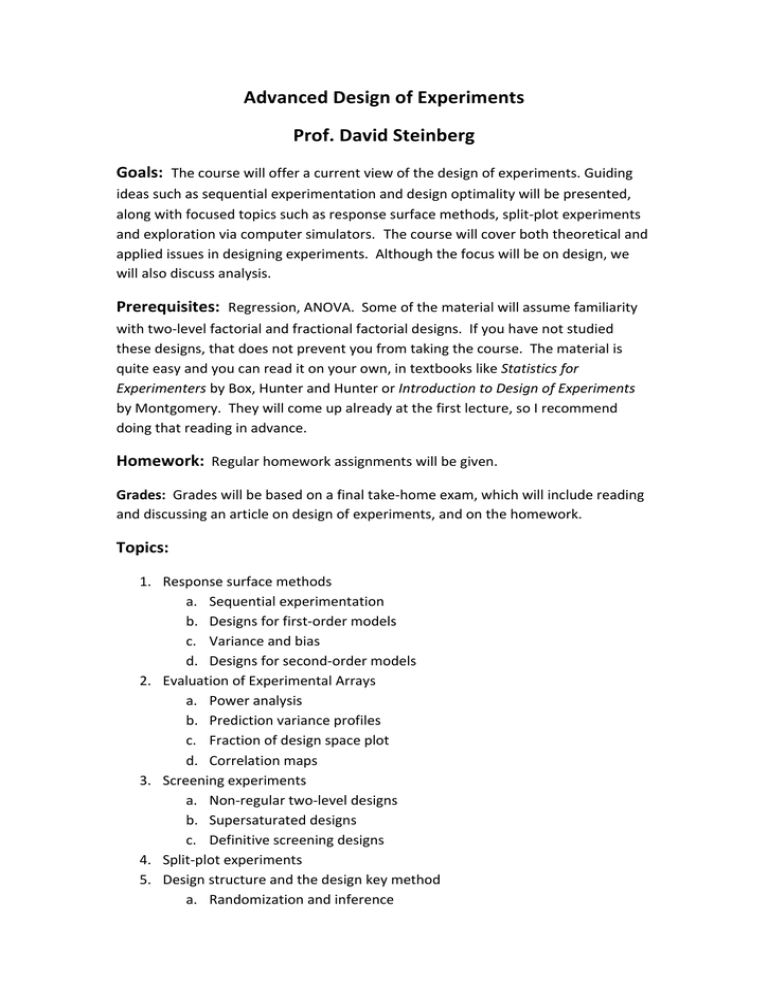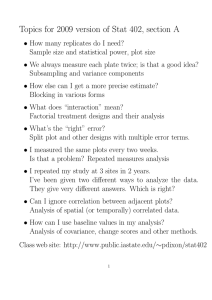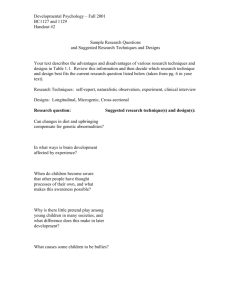Advanced Design of Experiments Prof. David Steinberg
advertisement

Advanced Design of Experiments Prof. David Steinberg Goals: The course will offer a current view of the design of experiments. Guiding ideas such as sequential experimentation and design optimality will be presented, along with focused topics such as response surface methods, split-­‐plot experiments and exploration via computer simulators. The course will cover both theoretical and applied issues in designing experiments. Although the focus will be on design, we will also discuss analysis. Prerequisites: Regression, ANOVA. Some of the material will assume familiarity with two-­‐level factorial and fractional factorial designs. If you have not studied these designs, that does not prevent you from taking the course. The material is quite easy and you can read it on your own, in textbooks like Statistics for Experimenters by Box, Hunter and Hunter or Introduction to Design of Experiments by Montgomery. They will come up already at the first lecture, so I recommend doing that reading in advance. Homework: Regular homework assignments will be given. Grades: Grades will be based on a final take-­‐home exam, which will include reading and discussing an article on design of experiments, and on the homework. Topics: 1. Response surface methods a. Sequential experimentation b. Designs for first-­‐order models c. Variance and bias d. Designs for second-­‐order models 2. Evaluation of Experimental Arrays a. Power analysis b. Prediction variance profiles c. Fraction of design space plot d. Correlation maps 3. Screening experiments a. Non-­‐regular two-­‐level designs b. Supersaturated designs c. Definitive screening designs 4. Split-­‐plot experiments 5. Design structure and the design key method a. Randomization and inference 6. 7. 8. 9. b. Blocking c. Nesting Algorithmic design of experiments a. Optimality criteria: D-­‐, A-­‐, I-­‐ and other related criteria b. Algorithms Computer Experiments a. Basic ideas b. Space-­‐filling designs c. Latin hypercubes d. Design criteria Internet experiments (if time permits) a. A/B Testing b. Bandit problems and Thompson sampling Non-­‐linear models (if time permits) a. Local optimality b. Bayes designs References: 1. Atkinson, Donev and Tobias. Optimum Experimental Designs, with SAS. Oxford Press. 2. Cheng. Theory of Factorial Design: Single and Multi-­‐Stratum Experiments. Chapman and Hall/CRC. 3. Dean, Morris, Stufken, Bingham (eds), Handbook of Design and Analysis of Experiments, CRC Press. 4. Goos and Jones. Optimal Design of Experiments: A Case Study Approach. Wiley. 5. Kenett and Zacks. Modern Industrial Statistics, 2nd Edition. Chapters 11-­‐13. 6. Wu and Hamada. Experiments: Planning, Analysis and Optimization. Wiley.

